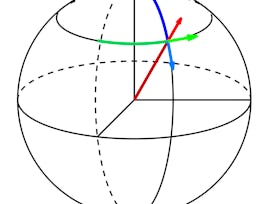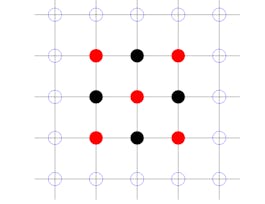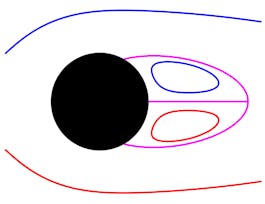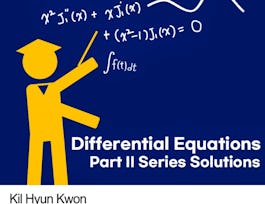This course is all about differential equations and covers both theory and applications. In the first five weeks, students will learn about ordinary differential equations, while the sixth week is an introduction to partial differential equations.


Differential Equations for Engineers
This course is part of Mathematics for Engineers Specialization
Taught in English
Some content may not be translated

Instructor: Jeffrey R. Chasnov
Top Instructor
62,969 already enrolled
Included with 
Course
(2,031 reviews)
98%
Recommended experience
What you'll learn
First-order differential equations
Second-order differential equations
The Laplace transform and series solution methods
Systems of differential equations and partial differential equations
Details to know

Add to your LinkedIn profile
31 quizzes
Course
(2,031 reviews)
98%
Recommended experience
See how employees at top companies are mastering in-demand skills

Build your subject-matter expertise
- Learn new concepts from industry experts
- Gain a foundational understanding of a subject or tool
- Develop job-relevant skills with hands-on projects
- Earn a shareable career certificate


Earn a career certificate
Add this credential to your LinkedIn profile, resume, or CV
Share it on social media and in your performance review

There are 6 modules in this course
A differential equation is an equation for a function with one or more of its derivatives. We introduce different types of differential equations and how to classify them. We then discuss the Euler method for numerically solving a first-order ordinary differential equation (ODE). We learn analytical methods for solving separable and linear first-order ODEs, with an explanation of the theory followed by illustrative solutions of some simple ODEs. Finally, we explore three real-world examples of first-order ODEs: compound interest, the terminal velocity of a falling mass, and the resistor-capacitor electrical circuit.
What's included
14 videos14 readings7 quizzes
We generalize the Euler numerical method to a second-order ODE. We then develop two theoretical concepts used for linear equations: the principle of superposition and the Wronskian. Using these concepts, we can find analytical solutions to a homogeneous second-order ODE with constant coefficients. We make use of an exponential ansatz and transform the constant-coefficient ODE to a second-order polynomial equation called the characteristic equation of the ODE. The characteristic equation may have real or complex roots and we learn solution methods for the different cases.
What's included
11 videos11 readings4 quizzes1 plugin
We now add an inhomogeneous term to the constant-coefficient ODE. The inhomogeneous term may be an exponential, a sine or cosine, or a polynomial. We also study the phenomena of resonance, when the forcing frequency is equal to the natural frequency of the oscillator. Finally, we learn about three important applications: the RLC electrical circuit, a mass on a spring, and the pendulum.
What's included
12 videos9 readings5 quizzes
We present two new analytical solution methods for solving linear ODEs. The first is the Laplace transform method, which is used to solve the constant-coefficient ODE with a discontinuous or impulsive inhomogeneous term. The Laplace transform is a good vehicle in general for introducing sophisticated integral transform techniques within an easily understandable context. We also introduce the solution of a linear ODE by a series solution. Although we do not go deeply into it here, an introduction to this technique may be useful to students who encounter it again in more advanced courses.
What's included
11 videos10 readings5 quizzes
We learn how to solve a coupled system of homogeneous first-order differential equations with constant coefficients. This system of ODEs can be written in matrix form, and we learn how to convert these equations into a standard matrix algebra eigenvalue problem. The two-dimensional solutions are then visualized using phase portraits. We next learn about the important application of coupled harmonic oscillators and the calculation of normal modes. The normal modes are those motions for which the individual masses that make up the system oscillate with the same frequency. We then apply the theory to solve a system of two coupled harmonic oscillators, and use the normal modes to analyze the motion of the system.
What's included
13 videos10 readings5 quizzes
To learn how to solve a partial differential equation (PDE), we first define a Fourier series. We then derive the one-dimensional diffusion equation, which is a PDE describing the diffusion of a dye in a pipe. We then proceed to solve this PDE using the method of separation of variables. This involves dividing the PDE into two ordinary differential equations (ODEs), which can then be solved using the standard techniques of solving ODEs. We then use the solutions of these two ODEs, and our definition of a Fourier series, to recover the solution of the original PDE.
What's included
11 videos11 readings5 quizzes
Instructor

Top Instructor
Recommended if you're interested in Math and Logic

The Hong Kong University of Science and Technology

The Hong Kong University of Science and Technology

The Hong Kong University of Science and Technology

Korea Advanced Institute of Science and Technology(KAIST)
Why people choose Coursera for their career




Learner reviews
Showing 3 of 2031
2,031 reviews
- 5 stars
88.58%
- 4 stars
9.83%
- 3 stars
1.18%
- 2 stars
0.04%
- 1 star
0.34%

Open new doors with Coursera Plus
Unlimited access to 7,000+ world-class courses, hands-on projects, and job-ready certificate programs - all included in your subscription
Advance your career with an online degree
Earn a degree from world-class universities - 100% online
Join over 3,400 global companies that choose Coursera for Business
Upskill your employees to excel in the digital economy
Frequently asked questions
Access to lectures and assignments depends on your type of enrollment. If you take a course in audit mode, you will be able to see most course materials for free. To access graded assignments and to earn a Certificate, you will need to purchase the Certificate experience, during or after your audit. If you don't see the audit option:
The course may not offer an audit option. You can try a Free Trial instead, or apply for Financial Aid.
The course may offer 'Full Course, No Certificate' instead. This option lets you see all course materials, submit required assessments, and get a final grade. This also means that you will not be able to purchase a Certificate experience.
When you enroll in the course, you get access to all of the courses in the Specialization, and you earn a certificate when you complete the work. Your electronic Certificate will be added to your Accomplishments page - from there, you can print your Certificate or add it to your LinkedIn profile. If you only want to read and view the course content, you can audit the course for free.
If you subscribed, you get a 7-day free trial during which you can cancel at no penalty. After that, we don’t give refunds, but you can cancel your subscription at any time. See our full refund policy.

